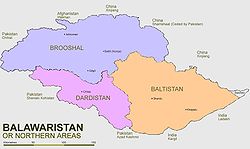Dardistan
| Dardistan | |
|---|---|
 The districts of Diamir and Astore belong to Dardistan |
|
| Basic data | |
| Country | Pakistan |
| Capital | Chilas |
| surface | 19,593 km² |
| Residents | 203,591 (1998) |
| density | 10 inhabitants per km² |
| Balararistan is located in the southwest of Gilgit-Baltistan | |
Dardistan (land of the Dardu , formerly Darada) is the largely historical name for a landscape in the Himalayas , north-western part of Kashmir (and thus controlled by Pakistan ), in the north by the Karakoram (middle pass height 5550 m), in the west by the mountain range, the Tschitral closes in the north (with peaks up to 5594 m altitude), in the east by the mountain range between the Indus and the Krischnaganga (Diamer, 8114 m) and in the northeast by the landscapes of Rongdo and Balti. Dardistan measures around 100 km in both north-south and east-west directions. The name Dardistan was mainly used by Europeans and by the people of Kashmir who live on the other side of the Indus.
Administratively, Dardistan is part of the Pakistani special territory Gilgit-Baltistan , which was called Northern Areas until 2009 , and comprises two districts of this administrative unit:
| District | Area (km²) |
Population 1998 |
main place |
|---|---|---|---|
| Diamir | 10,936 | 131,925 | Chilas |
| Astore | 8,657 | 71,666 | Gorikot |
| Dardistan | 19,593 | 203,591 | Chilas |
The highlands consist of many valleys, the mean height of which is 1500 to 2000 m. The valley of Gilgit was first explored by Europeans by Hayward , who was murdered here in 1870, and by Leitner , whom the government of the Punjab sent there for linguistic investigations in 1864. A first expedition under Adolf von Schlagintweit failed in 1856 due to uprisings in Gilgit. The Gilgittal is rich in wine and apricots; wheat is also grown here.
The valleys on both sides of the Indus are similar to the nearby Chitral in terms of climate and crops. the mountain areas, on the other hand, are rather inhospitable. Gold deposits that have been in use for centuries exist in the area.
Dardistan is relatively inaccessible. Only Gilgit and the upper Indus valley are accessible via developed roads. The local Dardu people profess Shiite Islam and were Buddhist in pre-Islamic times. The two most important tribes are the Jeschkun and the Shin, who advanced into the area one after the other. The Jeschkun are z. Partly identified with the Yuezhi who came from Sinkiang in the 2nd century BC. Immigrated to Bactria . The shin, on the other hand, are probably of Indian origin, as they venerate the cow as sacred. In their way of life, the Dardu resemble the rest of the Kashmiri inhabitants, but the language is related to Sanskrit and consists of several dialects, often including words of Persian origin; the characters used are also Persian.
Historically, small khanates have formed in the valleys , most of which were fighting with the Raja of Kashmir. After he became a vassal of the British crown in 1846 , the high mountain valleys of Dardistan also came under the influence of the British, who promoted the exploration and development of the area, especially since Kashmir was considered a strategically important outpost against possible Russian incursions into India. After India and Pakistan were granted independence , the war over Kashmir broke out between the two states, which ended in 1949 with the establishment of the " Line of Control ".
literature
- David Lorimer: Materials on the Ethnography of Dardistan (Pakistan). Part 1. Hunza. Academic printing and Verl.-Anstalt, Graz 1979, ISBN 3-201-01109-6 .
- David Lorimer: Materials on the Ethnography of Dardistan (Pakistan). Part 2/3. Gilgit. Chitral and Yasin. Academic printing and Verl.-Anstalt, Graz 1980, ISBN 3-201-01123-1 .
- Gottlieb William Leitner : Results of a tour in “Dardistan, Kashmir, Little Tibet, Ladak, Zanskar & c.”. Indian Public Opinion Press, Lahor 1867-1873, 4 volumes (The languages and races of Dardistan.)
- Dardistan . In: Encyclopædia Britannica . 11th edition. tape 7 : Constantine Pavlovich - Demidov . London 1910, p. 829 (English, full text [ Wikisource ]).

